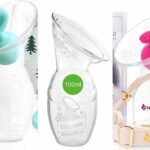As mothers, we always want was is best for our children. That’s why we choose to breastfeed. It can be concerning if something seems a bit off, like an abnormal smell while feeding.
Some mothers have traced a smell back to their babies, but others have discovered that it is the smell of their breast milk, even though they haven’t eaten onions or garlic.
This can be concerning, not to mention embarrassing if you’re breastfeeding around other people. It’s important to find out the cause and to determine if it is normal or not.
Breast Milk Smells Like Onion Or Garlic While Nursing
If your breast milk smells like onion or garlic, it can be a bit confusing at first. Typically, this can be traced back to specific things you have eaten or supplements that have been taken.
Most of these common causes can be avoided if your little one doesn’t like the new flavor, or if you find it embarrassing.
Eating Onions And Garlic
Both of these foods are known for their strong taste and smell. They often show up in excreted bodily fluids, such as sweat and breast milk, which could be why your breast milk smells like onions.
If you enjoy eating either of these, a quick change to your diet could easily help the new smell and taste become a thing of the past.
Fenugreek
Fenugreek is a supplement that is known to help increase your milk supply. A nice cup of Fenugreek tea can also help keep you hydrated, which will help you produce even more milk.
Unfortunately, one of the most common side effects is that breast milk smells like onions, even if you have not eaten any lately.
Decaf Coffee
Decaf coffee might seem innocent, but moms have reported that the onion smell went away after stopping their morning coffee.
View in gallery
If you’re a fan, try switching up your morning routine and see if your breast milk smells like onions after a few days without your morning cup.
Does Your Breast Milk Smell Sour?
Sometimes, your breast milk will have a sour smell to it. This can impact its taste, and it can be a cause for concern in certain situations. Make sure that it’s normal before feeding it to your baby.
It’s Actually Sour
If your breast milk was pumped and not immediately frozen, it might actually be sour. Most pediatricians and experts agree that it can sit out for an hour or so, but this depends on the temperature of the room too.
If it’s hot, it will go bad before the hour is up. In this situation, discard the sour milk.
This Is Common In Freshly Thawed Milk Due To Extra Lipase
Lipase is an enzyme that is found in breast milk. It helps break down the breast milk to make it easy for babies to digest it. Some mothers produce more than others, though.
The end result is that it winds up smelling and tasting sour after the milk is frozen. It can also have a soapy smell. This will not hurt the baby if they drink it.
If you have a baby that is refusing to drink it because of the taste, boil the milk and then rapidly cool it before freezing it.
Do You Smell Something Metallic While Breastfeeding?
If you smell something metallic while breastfeeding, chances are that your breast milk might also have a metallic taste. There are a few different things that can cause this, but they are easy to fix.
Lipase
While this enzyme is known for creating sour-tasting milk when it is stored in the freezer, it can also lead to a metallic smell in fresh breast milk. Some women simply produce a lot more of this enzyme than other women.
It can result in both a metallic smell and taste. Pumping and heating the milk to 180 degrees will help neutralize the lipase in the milk to give it a flavor that your baby will like.
- ✅ ULTRA FAST – Takes the temperature in a little as 2-3 seconds, and is accurate to +/-1 degrees with a wide range of -58℉-572℉(-50°C~300°C). No more waiting over a hot stove or grill for the temperature to settle! Take out the guesswork and eliminate overdone or undercooked food, and instead make perfectly cooked beef, chicken, pork, fish, lamb, or turkey, every time! Also works great with beverages, deep frying, making candy, and baking.
- ✅ COOK WITH CONFIDENCE - Never again worry about ruining a steak by over or under cooking. With our digital meat thermometer at your disposal, you can confidently cook any food to perfection. Get inspired to cook and BBQ more often. Be creative in the kitchen and eat healthier! These accessories even include a comprehensive laminated meat temperature guide for quick reference.
Prices pulled from the Amazon Product Advertising API on:
Product prices and availability are accurate as of the date/time indicated and are subject to change. Any price and availability information displayed on [relevant Amazon Site(s), as applicable] at the time of purchase will apply to the purchase of this product.
Excessive Iron
If you’re taking a multi-vitamin or suddenly eating more iron-rich foods, that could be the culprit. If you have too much iron in your body, it can lead to both a metallic smell and taste.
This iron will also be passed on to the baby, which can affect their bodies. They might have changes in bowel movements, for example. Take a good look at your diet, and make the necessary changes.
View in gallery
If you’re taking a vitamin or iron supplements, avoid them for a few days to see if there are any changes.
What About Cheese, Eggs Or Fish Smell Coming From Breasts?
Breast milk can smell like all kinds of things, including food. Some of it, like cheese, is strong. The same goes for fishy and egg smells. Thankfully, there are reasons and solutions for those.
Unusually High Lipase
Lipase is known for causing a different smell or texture in breast milk. How high the levels of lipase are can determine the smell and taste. If you notice a fishy, egg, or cheese smell, it can signal that they are unusually high.
Boob Sweat + Milk
When you wear nursing pads, they get milk on them. When you sweat, it can get under your boobs and on those same nursing pads. The combination of the two can be pretty rank.
Unfortunately, it tends to come with the territory, especially if you’re nursing through a massive heatwave.
To help with this, take showers 2-3 times daily if you can. Mothers tend to smell a little riper in the beginning because their body is releasing more hormones to help the baby identify their mom.
Also, change your nursing pads every time that you notice they are wet or when you feed your little one. Last, change your bra frequently. It gets better and you release fewer hormones through sweat as the baby gets older.
Final Word
If you have noticed an odor coming from your breasts or breast milk, it’s important to find the cause, especially if your little one is refusing milk.
Thankfully, it can usually be traced back to lipase or your diet. If it’s coming from your breasts, it’ll go away eventually on its own.
If you’ve tried these tips and your baby is still refusing milk, contact a lactation expert in your area for further advice.






